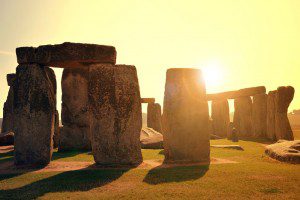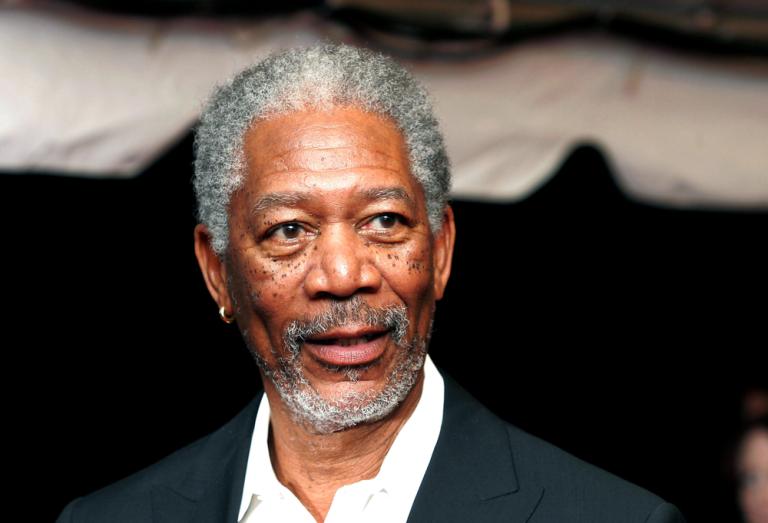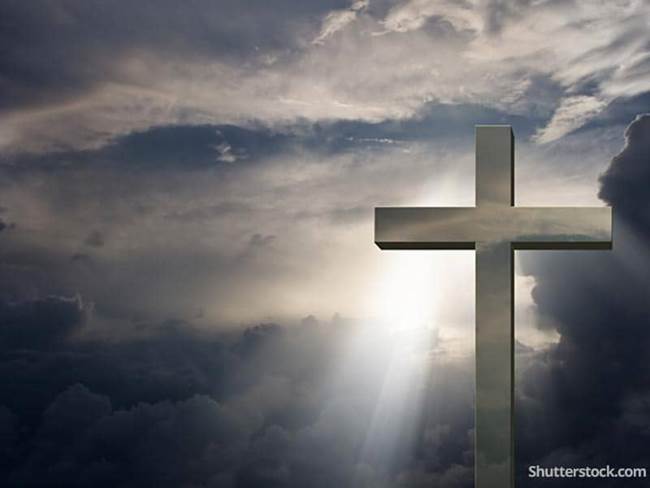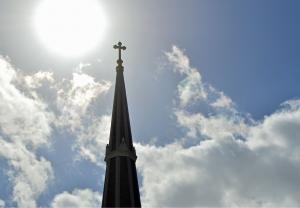By Brian Pennington.
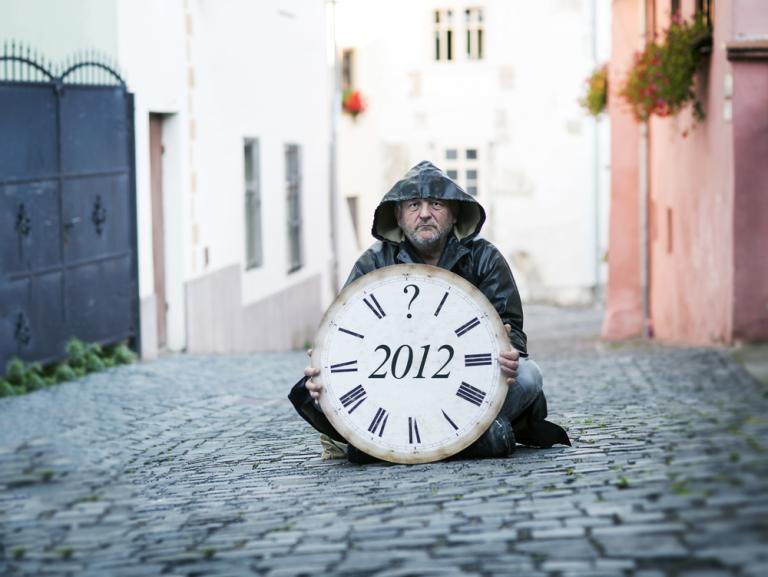
Last night, Morgan Freeman returned for the second installment of The Story of God, the National Geographic Channel’s stab at the television’s Quest for Meaning genre of infotainment programming. With Freeman zipping back and forth across the globe in the private jet he commands, he doggedly pursues elusive cosmic truths. This week, Freeman was fixated on “Apocalypse,” and he wasn’t sparing an ounce of jet fuel until he had grasped the meaning of humanity’s fascination with “end of days” scenarios.
Let’s be clear: Like Sean Hannity, The Story of God is TV, and we should only take it so seriously. It would be nice, for example, if it dared to venture beyond the well-trafficked questions of what religious traditions believe about the trajectory of history and asked us to think more expansively about, for example, how apocalyptic frameworks are foundational to U.S. culture, how they shape our political discourse and animate our pop culture. Because, however, this is pop culture, the Voice of God narrates the Quest while we are treated to a visual buffet of inferno, mayhem, and blood.
But I’m not going to be Condescending Professor Guy this week. I mean, sure, it is truly ridiculous that sacrificial priests ripped bloody, throbbing hearts out of their human victims for a second week in a row. (Or maybe it was awesome; I can’t decide). I confess, however, that I was generally pleased to see that some of the concerns I voiced after last week’s episode about the standard World Religions tour were not fully borne out this week. Episode 2 unfolded as much as a consideration of the reasons humans sometimes read the contemporary moment apocalyptically as a catalogue of various religions’ apocalyptic beliefs. This possibility wasn’t evident in the first half-hour, which proceeded in the most predictable ways: Morgan in Jerusalem and Qumran, delivering perfect “mind blown” reactions to rudimentary Intro to Biblical Studies disclosures about Roman-ruled Jerusalem and the origins of Christianity’s own apocalyptic habits. As the narrative reached John’s apocalypse, the Christian New Testament’s Book of Revelation, Freeman went right for the big hook: the anti-Christ and his identification with the “mysterious” number 666. When an archaeologist offered dramatic “proof” of what has long been the accepted identification of the Roman Emperor Nero as Revelation’s anti-Christ, the screen broke into a montage of car bombings and ISIS rallies as the lead-in to a treatment of Islamic apocalypticism, and I was ready to give up on the hope of any fresh or meaningful content.
But then the Voice of God maybe got a little embarrassed at the clashing cymbals, the explosions, the swords, and the wails that have always been the stock backdrop to cable television’s treatment of religious conflict. He turned aside from it all and walked into a quiet mosque in Chicago to talk to a former al-Qaeda recruiter who discussed his personal history as a Muslim youth bullied in Britain. He discussed what easy prey the powerless and disenfranchised are for recruiters who offer them a role in human history’s culminating battle. Freeman then talked to an experimental psychologist studying whether innate human fear responses can help explain the lure of apocalyptic thinking, and he followed yet another archaeologist through Mayan ruins to discredit widely held notions that Mayans predicted an end to the cosmos. (While, for some reason, a priest ripped a throbbing heart out of a human victim.)
Mayan theories debunked, Freeman then gently broached the possibility that, you know, maybe it’s all crap. That’s not quite the way the Voice of God put it, but as he turned to Buddhism, he observed that millions of people don’t function in a mental universe in which history reaches a crisis that ushers in a cataclysmic divine intervention. And to prove it, he went to meditate in India with the Karmapa. It was kind of a weird transition. I mean, there are standard Buddhist teachings about the Buddha’s eventual return. And recent history has seen Buddhist apocalyptic sects and violent, political Buddhisms driven by a dread of contagion in Sri Lanka and Myanmar. You could have easily filled another half-hour with explosions and freaky, hypnotic cult leaders. Of course, maybe the producers just wanted some footage of Morgan sitting cross-legged and namaste-ing a monk, but I’ll give them credit for at least using the opportunity to suggest, somewhat inelegantly, that our alarmist god-in-history rhetoric creeps out a large portion of the world who worries sometimes that the world’s only superpower is, well, a little bit crazy. When Morgan concluded the episode with a return to the U.S. to visit to post-Katrina New Orleans and offer a reminder about some real-life end-of-the-world shit, he did so by way of a discussion with a husband-and-wife pastoral couple and the thriving church they have built as a result of a crisis. God gave us a new beginning, they said.
Apocalypse, Morgan reminded us, means, “lifting the veil.” “It’s not about war,” he chided us. “It’s about enlightenment. It’s not about death. It’s a state of mind and heart that helps us see the truth. Not some far-off day of judgment. It’s here. It’s now.” It’s kind of schmaltzy, right? But it beats another human sacrifice. For that, tune in next week.
 Brian K. Pennington is a scholar of modern Hinduism and the Director of Elon University’s Center for the Study of Religion, Culture, and Society. His primary research interests are in colonial-era religion in India, the history of religion in South Asia, religion and violence, and contemporary religious change in India. He is the author of Was Hinduism Invented?: Britons, Indians, and the Colonial Construction of Religion (Oxford UP 2004/2007), editor of Teaching Religion and Violence (Oxford UP 2012), and co-editor, with Amy L. Allocco of Strategic Interventions: Ritual Innovation in South Indian Religion. His current book in progress, entitled God’s Fifth Abode: Entrepreneurial Religion in the Hindu Himalayas, is based on over a decade of field research in the pilgrimage city of Uttarkashi.
Brian K. Pennington is a scholar of modern Hinduism and the Director of Elon University’s Center for the Study of Religion, Culture, and Society. His primary research interests are in colonial-era religion in India, the history of religion in South Asia, religion and violence, and contemporary religious change in India. He is the author of Was Hinduism Invented?: Britons, Indians, and the Colonial Construction of Religion (Oxford UP 2004/2007), editor of Teaching Religion and Violence (Oxford UP 2012), and co-editor, with Amy L. Allocco of Strategic Interventions: Ritual Innovation in South Indian Religion. His current book in progress, entitled God’s Fifth Abode: Entrepreneurial Religion in the Hindu Himalayas, is based on over a decade of field research in the pilgrimage city of Uttarkashi.
Pennington has served on the Board of Directors of the American Academy of Religion (AAR), including its Executive Committee, the Board of Directors of the Society for Hindu-Christian Studies, the Advisory Council for the Conference on the Study of Religions of India (CSRI), and as President of the American Academy of Religion, Southeast Region.




